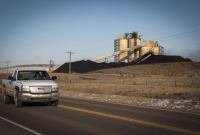Support strong Canadian climate journalism for 2025
ROCKY MOUNTAIN HOUSE, Alta. — A municipal council in Alberta Environment Minister Jason Nixon's constituency is the latest in a growing number of communities expressing concern about the province's plan to expand coal mining in the Rocky Mountains.
Clearwater County, which includes the town of Rocky Mountain House and about half the people Nixon represents in the legislature, voted unanimously Tuesday to send a letter to the United Conservative government.
Reeve Cammie Laird said the letter thanks the government for reinstating protections for the Rockies from surface coal mines and for reconsidering its decision not to hold public consultations. But it warns local people are worried.
"We'll be adding to the letter with regard to the concerns that we've heard," she said. "We received a number of emails and letters over the last month."
Coun. Theresa Laing said she's received about 400 emails and letters, only a couple of which support increased mining in the mountains.
"One of Canada's natural wonders is our Rocky Mountains and we're fortunate to have them in our backyard," she said. "Coal mining and these wonders are a bad juxtaposition."
Nixon, who is also government house leader, did not immediately respond to a request for comment.
Clearwater's move brings to 28 the number of Alberta municipalities that have expressed some level of concern over how the government has handled its plan to dramatically expand the province's metallurgical coal industry.
The municipalities range from Turner Valley, population 2,500, to the province's four largest cities.
The level of concerns varies widely. The town of High River is demanding that all coal exploration be immediately stopped and that no new permits be granted. The community of Edson is asking that the government reopen existing mines that have been mothballed before permitting new ones.
Six First Nations are protesting as well. Two are challenging the province in court, have told coal companies they will oppose any proposed mine and have asked the federal government to step in on any future environmental reviews.
Everybody says the government should talk to the public before making such a large land-use decision.
Last spring, the government revoked a policy that had protected the summits and eastern slopes of the Rockies since 1976. The move was made without warning, late on the Friday afternoon before the May long weekend.
Opposition gradually built and more than 100,000 signatures were collected on petitions. Last month, Energy Minister Sonya Savage said the policy would be reinstated, no new exploration leases would be sold on protected land and mountaintop removal mines banned.
She did not revoke leases on thousands of hectares sold after the policy was revoked. Drilling and road-building on those leases may continue. As well, Savage's ban on mountaintop removal mining doesn't extend to other types of surface mines.
She has said public consultations on coal mining are to begin March 29. No details have been released, including how the consultations will be conducted, how long they will take or what questions will be asked.
Laird said the consultations should take place in person, given the unreliability of rural internet.
"Our community members have been very clear they want in-person consultation."
She said it will be important for the government to consult widely, including with First Nations. She said the public should be asked not only how coal mining should proceed but whether it should go ahead at all.
"I think you need to ask both questions."
— By Bob Weber in Edmonton. Follow @row1960 on Twitter
This report by The Canadian Press was first published March 10, 2021.





Comments
Consultations are fine for expressing opinions but you can be sure that, as long as the Alberta gov't thinks it can be re-elected, it will ignore all the consultations and will proceed with the coal mining. And once the coal-mining permits are issued, it will be almost impossible to stop them...unless there is a new government.
They're not as popular as they were. If they keep screwing up, there's a very real chance they won't be re-elected; Albertans are happy enough about defending the oil patch, but even they are starting to wonder just how much use all the everybody-bashing is at doing that, and a bunch of them are getting pissed off at all the other stunts Kenney pulls.
Or just maybe the Conservatives will realize they're going to have to be a bit more responsive to the populace if they want to be re-elected. I kind of hope not, since I'm all for the Conservatives not being re-elected.